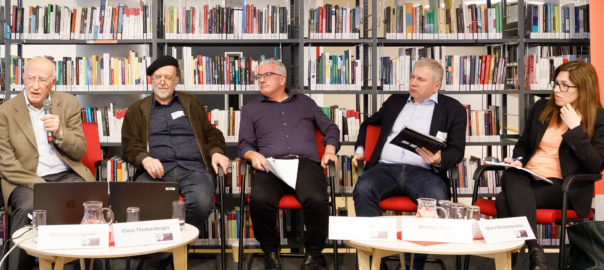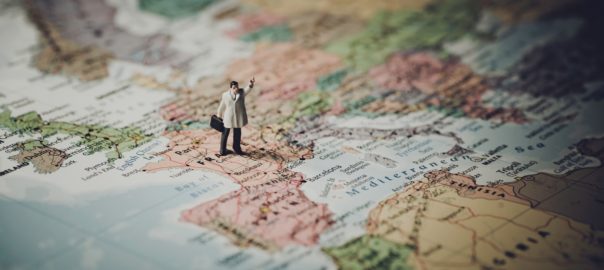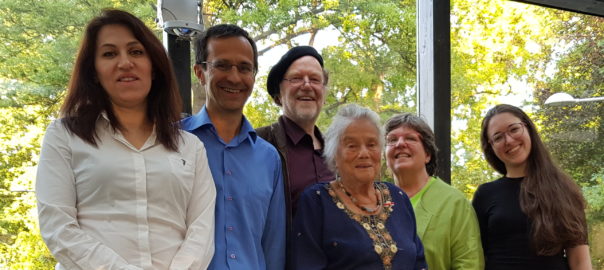PUTTING THE ECONOMY IN ITS PLACE
Peaceful coexistence and personal freedom are at risk. Both within and between countries tensions are already growing. Democratic achievements are under attack. “The end of history” proclaimed after the fall of the Berlin Wall has proven a fallacious promise. While average wellbeing has risen in economic terms, for a large and increasing number of people the prospects for a good and meaningful life are threatened. At the heart of these contradictory tendencies is a political vision that turns the entire society into a replica of the market economy.
Polanyi’s oeuvre provides us with a unique analytical framework, concepts and ideas to study the contradictions of a social fabric in which the social relationships are increasingly embedded in the economic system. Is it possible, we ask ourselves, that the conflicts, which accompanied the economic, social and political transformation of European societies in the 19th century and led to two world wars, the Great Depression and totalitarian regimes in the first half of the 20th century, are now affecting much vaster parts of the world and larger populations. Even if history is far from being repeated, we are convinced that Polanyi highlights three crucial issues that will shape our future:
1.1. THE QUESTION OF FREEDOM IN A COMPLEX SOCIETY
Up to now, freedom for all, not only for the few, has been an ambiguous promise on the part of classical as well as neoliberalism. Freedoms, which we cherish for their own sake – freedom of conscience, freedom of speech, freedom of meeting, freedom of association – have been accompanied by freedoms, which were harmful to the majority of common people – the freedom to exploit one’s fellows or the freedom to make excessive gains without commensurable service to the community. Today, once again, some of the freedoms that we esteem so much are under serious threat.
Polanyi’s writings offer a critique of the liberal idea of freedom and an alternative concept of social (solidarity, democratic and substantial) freedom that allows us to address the ambiguity. Polanyi’s central thesis is that the liberal notion, equating freedom with contractual relations, is illusory because it absolutizes the individual at the expense of the reality of society. The assertion that only unfettered markets guarantee freedom misdirects thoughts and judgements. If freedom means, as the liberal concept presupposes, that the individual only has to consider the consequences, “which are within his range of foresight” (Hayek: The Constitution of Liberty [2011], 146), who then bears the responsibility for the outcomes that the individual cannot be presumed to judge? Who accounts for unemployment, for humiliation and indignity, for economic crises, for the distribution of income and wealth? Who is responsible for climate change and the extinction of species? How could CO2-emissions be limited if decision-makers were ultimately accountable to shareholders? An idea of freedom that neglects the reality of the social and environmental consequences of our actions must be invalid.
If in a complex society no human decision is completely without social consequences, the notion of freedom cannot neglect the reality of society. On the one hand, the worldwide division of labor connects each individual choice through invisible bands with his fellow humans and, on the other hand, it hampers overview and awareness. The insight that “where there is no overview there is no freedom because without knowledge there can be no choice” (Polanyi: On Freedom, in Karl Polanyi’s Vision of a Socialist Transformation [2018], 312) is crucial for his thinking. Social freedom calls for deepening awareness of social connectedness through new forms of democracy, education and social control. Freedom for all requires empowering common people to contribute to the decisions that have hitherto been in the hands of the economic and political elites.
1.2. THE FUTURE OF CIVILIZATION: THE MACHINE AGE
“The nineteenth century gave birth to two sets of events of a very different order of magnitude: the machine age, a development of millennial range; and the market system, an initial adjustment to that development” (Polanyi: The Livelihood of Man, in Economy and Society [2018], 255). While in human history, the Industrial Revolution is comparable in terms of impact on society only to the Neolithic Revolution (i. e. the invention and diffusion of farming and settlement), liberal capitalism is no more than a historically rather limited period, a first attempt to cope with the implications of large-scale machines, mass production and an expanding division of labor.
We do not know where technological progress is going to take us. If we agree with Polanyi that the machine age “cannot, will not, and indeed, should not, be voluntarily discarded, the task of adapting life in such a surrounding to the requirements of human existence must be resolved if man is to continue on earth” (Polanyi: Our Obsolete Market Mentality, in Economy and Society [2018], 198). Economic liberalism sketches technological progress as part of the natural advancement of humankind. It is blind to the fact that behind the economic and social problems of the market society there loom the challenges of an industrial civilization that has already developed the instruments for self-destruction. In fact, the development of new technologies and their application are largely a consequence of military ambitions and the decisions of profit-oriented companies operating in a competitive environment. In Polanyi’s times, this resulted in the invention of the nuclear bomb and mass media. Today we have to face an apparently insatiable hunger for energy and new scientific revolutions marked by the mapping of the human genome, genetic manipulation, robotics, drones, the Internet, big data and artificial intelligence. Responding to the challenges of the machine age means, above all, enabling the common people to understand, assess and shape decisions on the future course of technological progress. The dangers inherent in the technological possibilities can only be coped with if societies gain control over the decision-making processes on which human life on this planet depends.
1.3. ALTERNATIVES TO MARKET SOCIETY
The double movement produced the collapse of European civilization of the 19th century. The search for a truly democratic society is not merely the search for strengthening social protection against the destructive effects of market fundamentalism, but a search for an answer to the challenges of a technological civilization. It presupposes nothing less than a fundamental cultural transformation that substitutes the principles of solidarity, empathy and a “good life for all” for efficiency and economic growth. The culture of individualism, of infinite improvement and the boundless multiplication of material wealth has to give place to real tolerance, in which recognition of differences is based on interest and knowledge of the specific circumstances of life.
Such an alternative first calls for replacing neoliberal “planning for competition” with planning for social freedom and solidarity. Democracy is not only a value, which we cherish for its own sake, but also a precondition for overview and freedom for all. Secondly, the fictitious goods, labor, nature and money, as well as social security, care, education, culture etc., must be freed from the control by the competitive market system. Thirdly, the call for deglobalization does not mean the end of the international division of labor, but the replacement of the “helpless method of free trade” (Polanyi: Common Man’s Masterplan, in Economy and Society [2018], 181) by voluntary agreements between responsible governments. Polanyi’s motto “regional planning instead of universal (or global) capitalism” has lost nothing of its importance. The same holds, fourthly, for Polanyi’s claim for personal freedom, which “must be preserved at all costs, including the price of efficiency in production. … An industrial society can afford to be free” (Polanyi: TGT [2001], 264).
There are (and there can be) no handy answers to the question of how to “put the economy in its place”. We are aware of the fact that social sciences cannot pretend to know what should be done, nor can they decide how it is to be done. They can only act as participants and contribute to shedding light on the possible consequences of alternative choices.




